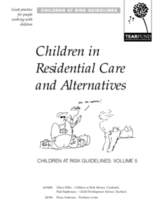If residential care means being cared for by generally unrelated people, and we believe that the essence of family life is the nurture and unconditional acceptance of children by adults in an individual adult-child relationship, then we can see that residential care may fail to provide this. In fact the larger and more institutional the residential care, the less likely such individual nurture and unconditional acceptance is. The ‘key-worker system’, ensuring that each child has someone who is responsible for them, goes some way in seeking to prevent a ‘faceless’ care system. By placing a selected case worker with each child, many basic care needs can be reviewed and carried out regularly.
But is it enough? Some residential care is run by groups of caring adults who are committed to children and provide a family environment where there is unconditional acceptance and support on an individual basis. It could be argued that this kind of care is in the best interests of children where there are no alternatives: for example, those who are either in abusive or destructive family environments or cannot settle with a small foster family.
It is therefore too simplistic to say that children should never go to residential care and children should always stay with their parent(s). However, it is not easy to say at what point a child should be removed from their family and at what point a residential centre is appropriate. In seeking the best interests of the child, the questions of how to remove a child from the family, the availability of alternatives, and the desires of the children themselves, all need to be taken into consideration.
©Tearfund

